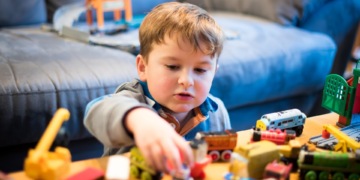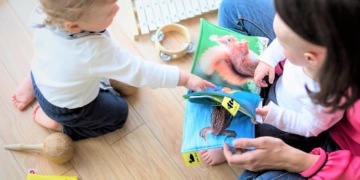Key Notes
- Temper tantrums in children are common and a part of their development
- There are majorly four reasons for a tantrum to look out for; hunger, tiredness, frustration, and anger
- Do not respond to a child's tantrum with anger, which will leave a negative impact. Instead, always stay calm and composed
- Acknowledge and talk to your child about their emotions so they learn to handle them better next time
As exciting as parenting is, it can get quite tiring at times. One of the most difficult times for parents is when their toddlers go through temper tantrums.
Even though it’s a normal phase of life almost every child goes through, it causes a lot of stress to the parents and the child itself, especially if it happens in public.
Here in this article, we’ll discuss about what toddler temper tantrums are and how you can deal with them in the most effective way.
What is meant by Toddler Temper Tantrums?
Temper tantrums occur as an ongoing developmental phase in a child’s life. In this, the child experiences intense emotions and short outbursts.
A toddler’s brain does not have a developed emotional and language system; hence, they do not know how to cope with strong emotions. So, when they feel stressed out, the gland in their brain known as the amygdala is activated, which causes the release of stress hormones.
Unlike adults, the little ones do not know how to speak out their emotions in a normal way; thus, they act out in a way that encapsulates how they are feeling, such as by crying, throwing things, hitting, screaming and etc.
This time period is also sometimes known as the terrible twos because these tantrums usually start at the age of 1 and can go on till they reach the age of 3 or 4.
However, it’s important to remember that this is normal, and a child having a tantrum does not mean bad parenting.
Why Do the Tantrums Happen?
As a child grows older and reaches the toddler age bracket, they feel the need to be more independent and be in control of things. When this feeling is not met, it results in an emotional outburst. This could be due to various different reasons such as:
- Intense emotions: one of the reasons why your toddler could act out is because of the feelings of anger or frustration. This can happen in situations they do not feel in control of, such as if a toy is taken away from them or they are being said no to a certain thing.
- Hungry: It’s common for an adult to feel hangry at times, and the same is the case with toddlers. Children tend to get irritated and moody when they are hungry, which leads to them crying or screaming.
- Tiredness: another reason for temper tantrums is if the child is sleepy or feeling tired.
- Attention: A child of a young age needs a lot of attention from their parents, and if they don’t get it, it can cause them to show their anger.
The Signs of Temper Tantrum
When going through a temper tantrum, the child might do things which include:
- Loud crying fits
- Screaming at everything
- Stomping the ground
- Hitting or biting
- Throwing things away
- Holding their breaths
- Swinging of arms and legs
- Tensing the body
How to Deal with Toddler Temper Tantrums
When your child is in the process of having a breakdown, the worst thing to do is to respond back with anger, as that’ll only make the situation worse for both you and the kid.
Following are the things you can do to control the situation:
Figure out the reason
The first step is to remain calm in those circumstances and find out the reason why your child is upset. If it’s due to the fact they’re hungry or tired, then the solution is easy; all you’ve got to do is give them food or let them sleep. However, if the tantrum is due to them being refused by you over something, the approach is slightly different.
Distraction
When you see your toddler is on the brink of an emotional outburst, the best thing would be to distract them. However, this does not mean that you give in to their demands. For example, if they wanted a toy that you said no to, maybe sing a lullaby or give them another type of toy to play with.
Because of their short attention spans, toddlers can get easily distracted, and it’s the best way to control their tantrums.
Reassurance
Children look up to their parents, so if your child is having a breakdown, you can say words of affirmation, e.g., “I hear you,” or give them a hug so that they know you can understand their feelings. This will also build up a positive bond between you and your child.
Reasoning
The worst mistake would be trying to reason with a child amid a tantrum. The toddler will be full of emotions and won’t be listening to you, so asking about their feelings at that stage would be pointless.
Talking
Once your child has calmed down, now’s the time to talk to them about their feelings. Ask them about what made them react that way and give labels to what they felt, such as “happy, sad, angry.” Next, teach your child how to use words to express their emotions.
Time-out
This should be the last option if your child doesn’t respond to anything else. Do not leave the child alone completely, as that’ll affect them negatively. The time out shouldn’t be longer than a minute or two; otherwise, the toddler will feel alone.
After that, tell them about why they were given a time out and address their behavior in a calm way.
So, don’t blame yourself when facing your child’s temper tantrum, and it’s also important not to blame them either. Raising a child is a big job, but a few tips and tricks can help you get the hang of it.




























